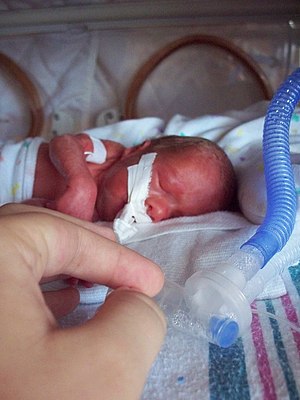Neonatal infection
| Neonatal infection | |
|---|---|
 |
|
| 26-week gestation, premature infant, weighing <990gm with ventilator | |
| Classification and external resources | |
| Specialty | Infectious disease, Pediatrics |
| ICD-10 | P36 A50 P37 P35P23 Y95 |
Neonatal infections are infections of the neonate (newborn) during the neonatal period or first four weeks after birth. Neonatal infections may be contracted by transplacental transfer in utero, in the birth canal during delivery (perinatal), or by other means after birth. Some neonatal infections are apparent soon after delivery, while others may develop postpartum within the first week or month. Some infections acquired in the neonatal period do not become apparent until much later such as HIV, hepatitis B and malaria.
There is a higher risk of infection with preterm or low birth weight neonates. Respiratory tract infections contracted by preterm neonates may continue into childhood or possibly adulthood with long-term effects that limit one's ability to engage in normal physical activities, decreasing one's quality of life and increasing health care costs. In some instances, neonatal respiratory tract infections may increase one's susceptibility to future respiratory infections and inflammatory responses related to lung disease.
Antibiotics can be effective treatments for neonatal infections, especially when the pathogen is quickly identified. Instead of relying solely on culturing techniques, pathogen identification has improved substantially with advancing technology; however, neonate mortality has not kept pace and remains 20% to 50%. While preterm neonates are at a particularly high risk, full term and post-term infants can also develop infection. Neonatal infection may also be associated with premature rupture of membranes (breakage of the amniotic sac) which substantially increases the risk of neonatal sepsis by allowing passage for bacteria to enter the womb prior to the birth of the infant. Research to improve treatment of infections and prophylactic treatment of the mother to avoid infections of the infant is ongoing.
...
Wikipedia
